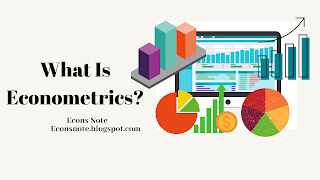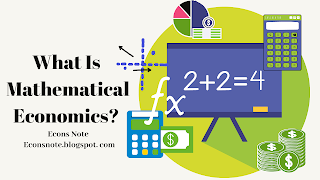Mathematical Economics Vs Econometrics – Definitions, Relationships, Differences and Career Opportunities
Econometrics and Mathematical Economics are two confusing terms in economics. It's quite easy to confuse these two terms because they are interrelated and complementary to each other. Besides, there are lot of universities who combine these two courses together, as in "Department of Econometrics and Mathematical Economics".
Universities like Tilburg and the London School of Economics and Political Science are very good examples and one reason why I think they do this is to help their students have a wider knowledge and a better opportunity in the labour market. However, the fact that mathematical economics is related to econometrics doesn't mean the two are one.
So in this post, we shall be taking an in dept look at these two economic terms so that you can really understand their concepts, relationships, and the differences between them. However, we shall also be looking at the career opportunities of studying the two, as a combine course.
What Is Econometrics?
In simple words, Econometrics is the measurement of economic data using statistical techniques. The main reason for this data measurement is to help economists understand economic situations: to solve economic problems, predict future economic behavior and to propound or test economic theories.
In a more comprehensive way, we can say Econometrics is a branch of economics that deals with economic data or variables.
In real sense, it's a field that is mainly interested in finding out the kind of relationship that exist between a dependent variable and a or several independent variables, through quantitative analysis.
Take for instance, when we say the level of a person's income depends on his level of education and working experience. We simply mean Y = f(Ed, Ex). Where Y = income, Ed= Education and Ex= Years of Experience.
But Econometricians believe that, that's just an assumption (a postulate) and won't consider it until there are empirical proof or quantitative facts (i.e. numerical data) that can show that there's truly a relationship between the level of ones income, level of education and his years of experience.
These numerical data are classified into three classes: we have the Time series, Cross-sectional data and Panel data. So what econometricians do in this aspect, is to collect enough data and verify if the assumption is realistic enough by conducting a regression analysis.
So if peradventure it's true that such relationship actually exist, then we can go ahead to accept the hypothesis and even use it to forecast the values of income in terms of level of education and working experience.
Thence, we can simply say that, econometrics is the use of statistical and mathematical techniques in the fields of economics so as to verify assumptions, test hypotheses/ theories and to formulate policies.
What Is Mathematical Economics?
Unlike econometrics, mathematical economics is not a distinct branch of economics. In fact, it's just an approach used across various branches of economics, whereby economic concepts are explained in mathematical context.
And by definition, mathematical economics is simply the use of mathematical symbols, methods and reasoning in solving and explaining economic problems.
For instance, instead of explaining the concept of market equilibrium as a situation whereby the total number of goods being supplied to a market is equal to the total number of goods being demanded for by consumers. We can simply say; market equilibrium is when Qd = Qs. Where Qd=quality demanded and Qs= Quality supplied. Simple!
Similarly, instead of using words to explain the relationship between two or more variables (like we did above), we can simply employ mathematics and draw a graph or create a chart that shows such relationship.
Furthermore, mathematical economics helps economists to quickly arrive at conclusions by adopting mathematical methodology of *if...* (condition/proposition) and *then.....* (effect/result). For example: if x = y. Then, y=x or y is x.
Lastly, there are lots of reasons why we use mathematics in economics and it has been used to the extent that we can say it's the backbone to economic studies. After all, almost all economics textbook exemplifies mathematical economics.
So, what kind of relationship exist between Mathematical Economics and Econometrics, that make some students to assume the two term as one?
Relationship Between Mathematical Economics And Econometrics
Like many other branches of economics, there exist a kind of relationship between mathematical economics and econometrics. But how and in what manner?
Well, its obvious that Econometrics depends on Mathematical Economics such that every observation and economic data are represented mathematically.
Basically, we employ mathematics in econometrics (like in every other economics fields), to solve problems of variables, relationships, equations and numerics. Besides, an econometricians often rely on mathematical models built by mathematical economists.....
Conclusively, the application of mathematical economics in econometrics gives econometricians the confidence to "play around" with economic data. However, the only similarity between econometrics and mathematical economics is that, they are both used across various branches of economics, though for different purposes.
So if that's it, then what are the key differences between econometrics and mathematical economics? Or how can we differentiate between the two terms?
Understanding Mathematical Economics Vs. Econometrics
Despite the fact that econometrics and mathematical economics are interrelated, there are still distinct lines that set them apart in terms of concept, nature, purpose and procedures/methodology.
1: Econometrics is considered a subfield in economics while mathematical economics is just an approach to economic analyses.
2: While econometrics is concerned with the measurement of economic and financial data, mathematical economics is concerned with applying mathematics to the theoretical aspects of economics.
3: Econometrics is known to be the combination of economics, statistics and mathematics while Mathematical Economics is just the unification of economics and mathematics.
4: Econometrics is used to extract and analyse relevant economic data, but on the other hand, mathematical economics is used in stating and explaining (or solving) economic problems.
5: The purpose of econometrics is to create theories, verify them and to formulate economic policies. Whereas the purpose of mathematical economics is just to clarify economic concepts and to quantitatively conduct economic analyses.
6: Lastly, in mathematical economics, we assume that assumptions can be proved logically and that the relationship between variables can be explained by calculation.
Meanwhile in econometrics, assumptions are considered as mere assumptions until they are data-proven; also, relationship between variables are believed to indeterminable except if there are data to support such relationship.
As mentioned earlier, I said there are some universities who combine this two aspects of economics as a single course...... So, what are the benefits of studying Econometrics and Mathematical Economics?
Benefits And Career Opportunities Of Studying Econometrics And Mathematical Economics
As an economics student, you can chose to major in Econometrics and Mathematical Economics as a Bachelor or Master of Science (B.Sc./M.Sc.). However, that's if you love working with data and you're good in math and statistics. So, why am I talking about this?
Well, one of the reasons why I recommend this programme is that it will help you to expand your knowledge as you'll be learning from the cutting edges of other fields in economics. Wow, that's an advantage right? Yes, and in addition to that, you'll be able to blend into other fields like Agriculture, Health, Natural Science and Technology.
Secondly, studying Econometrics and Mathematical Economics will help you to have the necessary set of skills to analyze data, forecast economic situations and to provide solutions to real-world economic problems such as poverty, mass unemployment, recession and inflation.
Another reason why I think you should study this course is that it will help you to always understand whatever is happening in an economy and how to make the right decisions.
So, what are the career opportunities that await you if you put in for this programme? Or alternatively, what does the future holds for you if you choose to study the course?
Honestly, there are lots career opportunities in this field, so you don't have to worry about the future; it's secured.
Oh, you mean what about technology advancement? Well, as long as the world will continue to need and demand for econometricians to conduct research and present updated information, then all is well. Besides, the world economy will always evolve the same way technology does, so that's a plus!
With a Master degree in Econometrics and Mathematical Economics, you can work in:
- Banks And Financial Institutions – World Bank, Central Banks, Insurance Companies, Investment Banks and Stock Exchange Companies
- Government Setups/Bodies/Agencies – Boards of Revenue, Bureau of Economic Analysis, Census Bureau (National Population Commission) and National Bureau Of Statistics.
- Educational Institutes – Universities, Polytechnics, Colleges of Education and Ministries of Education.
- Health Database Organizations
- Research Institutes (based on industrial and environmental matters)
- Research Department Of Large Companies.
- Consulting Firms (you can even set up your own)
- Technology Companies – Apple, Microsoft, Amazon....or even telecom companies like MTN.
- Pension Organizations (both public and private)
- Agricultural Institutes – Agricultural Banks and Agricultural Research Institutes.
You can work in these places as a:
- Data Analyst
- Financial Analyst
- Market/Business Analyst
- Public analyst
- Researcher
- Consultant
- Policy Advisor
- Lecturer
- Technical instructor and
- Director
But please note that this list is non-exhaustive and should not in anyway be considered a master list of careers and job titles.
Conclusion
To this end, I hope you've been able how understand how Mathematical Economics differs from Econometrics in terms of concept and purpose.
But in case you're still a bit confuse, I want you to think of mathematical economics as a use of language (math) in economics, and econometrics as a report of an investigation.
So typically, you should know that a report will be written in a language. However, this report itself is not a language. Rather, it's the result of a research written in a language.
Although Econometrics and Mathematical Economics are quite different in terms of purpose and application, they still go hand in hand to be effective. For instance, econometrics relies on mathematical models to test hypothesis, so also do mathematical economics depends on econometrics' empirical observation to predict economic behavior.
Therefore, they both function together and are separately of great use in the fields of economics. Of course, you must have known that they are both used in virtually all the branches of economics such as labour economics, industrial economics, financial economics, monetary economics, development economics, international economics, transport economics.......
The combination of these two fields has not only helped economists to build up a body of principles but also to understand the current economic problems and the consequences of pursuing a particular line of policy.
Got some questions? Or do you have something more to say? Please kindly leave a comment below and don’t forget to also share and subscribe to my Email newsletter for more simplified Economics note like this. Love you!






Comments
Post a Comment